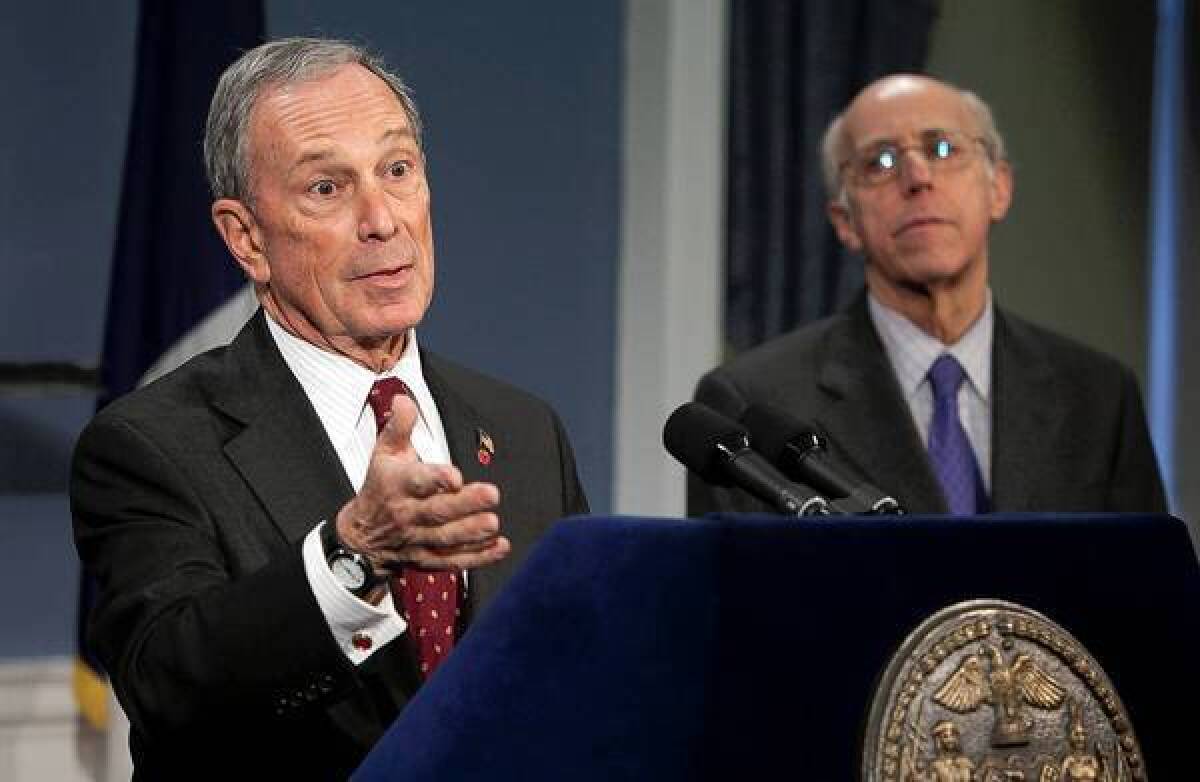Judge blocks New York City ban on large sugary drinks

- Share via
NEW YORK — A judge on Monday invalidated anti-obesity rules that would have made New York the nation’s first city to restrict sales of super-sized sugary drinks, setting up a showdown with Mayor Michael R. Bloomberg, who called the last-minute ruling “completely wrong” and vowed to appeal.
State Supreme Court Judge Milton Tingling’s 36-page decision was issued the day before the limits were to take effect. It was a victory for a coalition of groups, including labor unions and the restaurant industry, who had sued to block enforcement after the city’s Board of Health easily approved the regulations in September.
Tingling said the measure was “laden with exceptions” that made its enforcement “arbitrary and capricious.” Among those exceptions: It would have affected only food service establishments regulated by the city’s Board of Health, such as restaurants, delis and concession stands at cinemas and stadiums.
Grocery stores and corner markets, which are regulated by the state, would not have been affected, meaning a McDonald’s could not have sold a 32-ounce soda, but a 7-Eleven across the street could have sold a Big Gulp.
Citing past court battles and governing tools, from the city’s original 1686 charter to a ruling on dog licenses, Tingling also said the Board of Health did not have the authority to pass such rules and that allowing it to do so would undermine limits on authority aimed at preventing abuse of power.
“Such an evisceration has the potential to be more troubling than sugar-sweetened beverages,” Tingling said, quashing for now a measure that had food service establishments rushing to edit their menus and replace giant cups with smaller ones.
The rules would have limited to 16 ounces the size of sugary drinks in city establishments, but it would not have prevented consumers from buying more than one drink to satisfy cravings for super-sized sodas.
Businesses violating the rules could have been fined $200. Milkshakes and coffee-based drinks made with at least half milk or ice cream, even those boasting a seam-bursting 600 calories or more, would not have been affected because of the nutritional value in their dairy products.
“This is a great victory,” said Dawn Sweeney, president and chief executive of the National Restaurant Assn., which argued that the rules would have cost food service businesses customers and forced them to spend money to replace super-size cups.
“The court ruling provides a sigh of relief to New Yorkers and thousands of small businesses in New York City that would have been harmed by this arbitrary and unpopular ban,” said the American Beverage Assn., which had joined other groups in suing to block the rules.
But Bloomberg, who has made improving health a cornerstone of his mayoralty, made clear he was not backing down and said he had an obligation as mayor to save New Yorkers from their destructive habits.
“While other people will wring their hands over the problem of sugary drinks, in New York City we’re doing something about it,” said Bloomberg, who in three terms has ushered in other trendsetting regulations and lifestyle changes.
In 2008, New York became the first major city to require large restaurant chains to include calorie counts on menus. Similar laws have since been adopted elsewhere in the country. In 2006, it passed the country’s first law slashing the use of artificial trans fats in prepared food. In 2011, it banned smoking in most public areas. Bicycle paths have sprung up, leading to losses of parking spaces.
Those and other measures have helped extend New Yorkers’ life expectancy beyond the national average, Bloomberg said, noting that past measures had also been met with protests and sometimes lawsuits, but that the city had always prevailed.
“Any time you adopt a groundbreaking policy, special interests will sue,” he said. “That’s America.”
According to the city, 58% of New Yorkers — and nearly 40% of the city’s public schoolchildren — are overweight or obese. On Monday, the city released new data to bolster support for the soda ban, saying that a survey showed neighborhoods with the highest obesity rates also consumed the most soda.
A poll of the city released last month by Quinnipiac University showed 51% of respondents supporting the soda ban, with 46% opposed.
As he left a McDonald’s with two large sugary drinks Monday, Young Israel said he opposed the ban, but it was money more than flab that worried him. Israel predicted that if the ban took effect, restaurants would raise prices for smaller drinks to match the current price for the largest drinks.
“To me, it’s a way for big business to get more money off of consumers,” said Young, predicting that today’s “medium” drink could be tomorrow’s “large,” with the price to match.
As for the health issue, he said that with or without the ban, adults would eat and drink what they wanted. “When it’s time for me to go to the gym and push back from the plate, I’ll do it,” Young said. “And I’ve already lost a few pounds without any law telling me when to stop drinking sweet drinks.”
More to Read
Sign up for Essential California
The most important California stories and recommendations in your inbox every morning.
You may occasionally receive promotional content from the Los Angeles Times.











